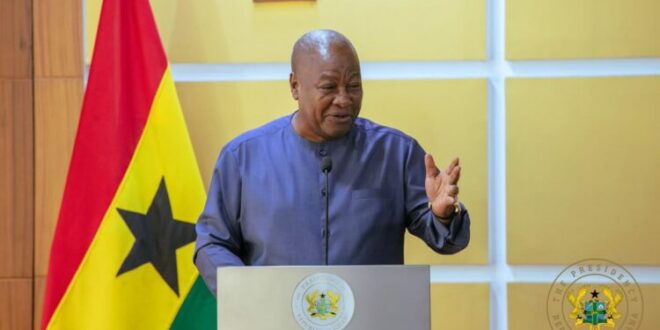In a political landscape once scarred by apathy, indecision, and institutional decay, President John Dramani Mahama’s return to leadership has ignited a compelling new chapter. one forged not by rhetoric but by action, empathy, and audacious clarity of purpose. In just 120 days, his presidency has become a testament to what visionary governance looks like when powered by courage, competence, and conviction.
From the moment he took office, President Mahama made one thing unmistakably clear: Ghana will not be governed on autopilot. In record time, he assembled a cabinet, not as a political ritual, but as an engine of revival. Every appointment, every directive, every reform has reflected a single philosophy that the destiny of this nation cannot be left in the hands of timidity or transactional politics. The machinery of government has not just been restarted; it has been reengineered to serve the people with integrity and urgency.
Gone is the burdensome tax regime that choked households and businesses alike. With the sweeping elimination of the E-Levy, Betting Tax, and Emissions Levy, and a clear intention to scrap the COVID-19 Levy. Mahama has signaled a dramatic pivot toward economic justice. This isn’t populism. It is principled policymaking. It is a clear rejection of fiscal exploitation disguised as reform.
But beyond economic liberation lies an equally compelling story of human-centered progress. Through the “No Fee Stress” initiative, Mahama has lifted the weight off the backs of basic school parents, and through the groundbreaking provision of free tertiary education for persons with disabilities and free sanitary pads for schoolgirls, he has sent an unequivocal message: the margins of society are no longer invisible.
Then there is the digital revolution, a future now within reach. The One Million Coders Programme is not a dream. It is a strategy. It is the planting of intellectual seeds in Ghana’s youth that will blossom into innovation, entrepreneurship, and global relevance.
In these 120 days, Mahama has shown that leadership is not merely about occupying space at the top of government, it is about reshaping the lives at the base of society. His Mahama Cares social protection framework, the Adwumawura employment program, and the reformation of wasteful State-Owned Enterprises are all reflections of a leader who understands that good governance must touch the lives of the ordinary and do so swiftly.
He has confronted ghosts that many before him were too afraid to face. The bold steps taken to investigate the Akosombo dam spillage and reopen the Ahmed Suale murder case underscore a fierce return to justice, to truth, and to institutional redemption. This is not mere optics; it is the reawakening of Ghana’s moral compass.
Yet, this march toward transformation is not without unfinished trails. Some pledges remain on the horizon the review of vehicle taxes, full-scale implementation of the 24-hour economy, and cleansing the security forces of partisan contamination. But let it be said: a government that does this much in 120 days is not flirting with change—it is married to it.
Conclusion:
John Mahama’s first 120 days have not been a political honeymoon; they have been a civic revolution. He has not tiptoed into governance he has stormed the gates of stagnation with bold intent. He has governed with steel in his spine and empathy in his heart.
This is the leadership Ghanaians voted for not to be entertained, but to be liberated.
The journey has only just begun.
E-mail: ahmedgedel69@gmail.com
 Home Of Ghana News Ghana News, Entertainment And More
Home Of Ghana News Ghana News, Entertainment And More





